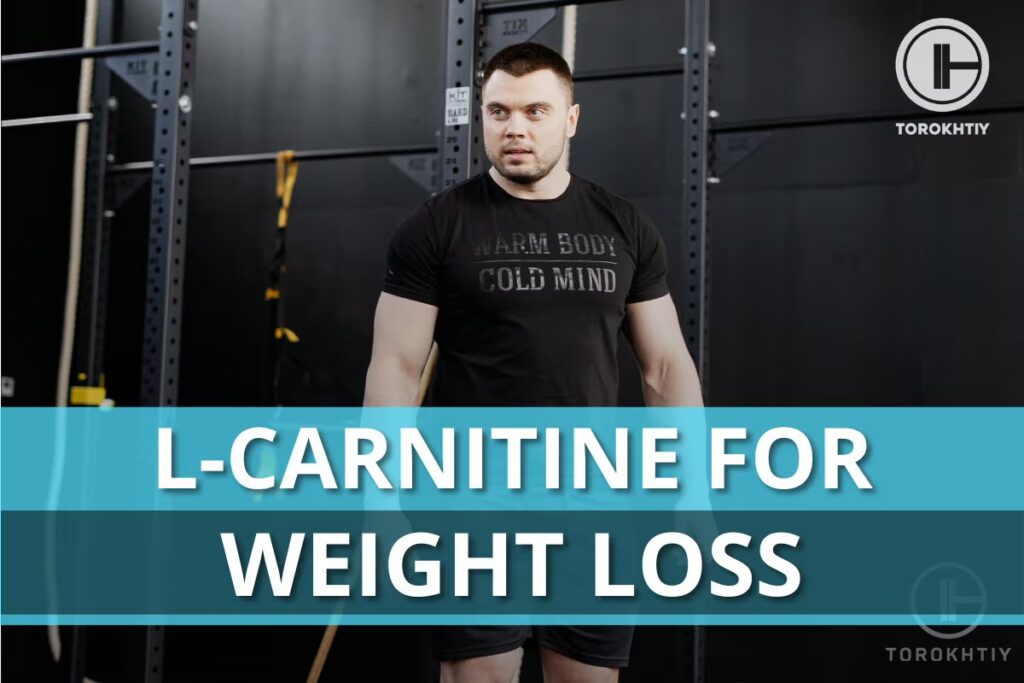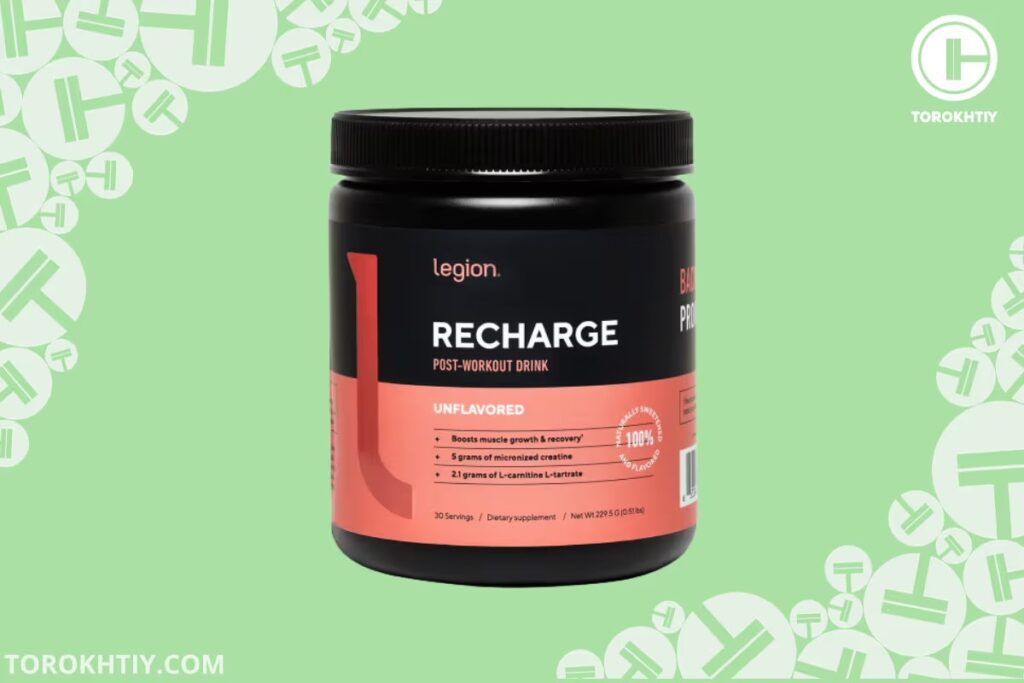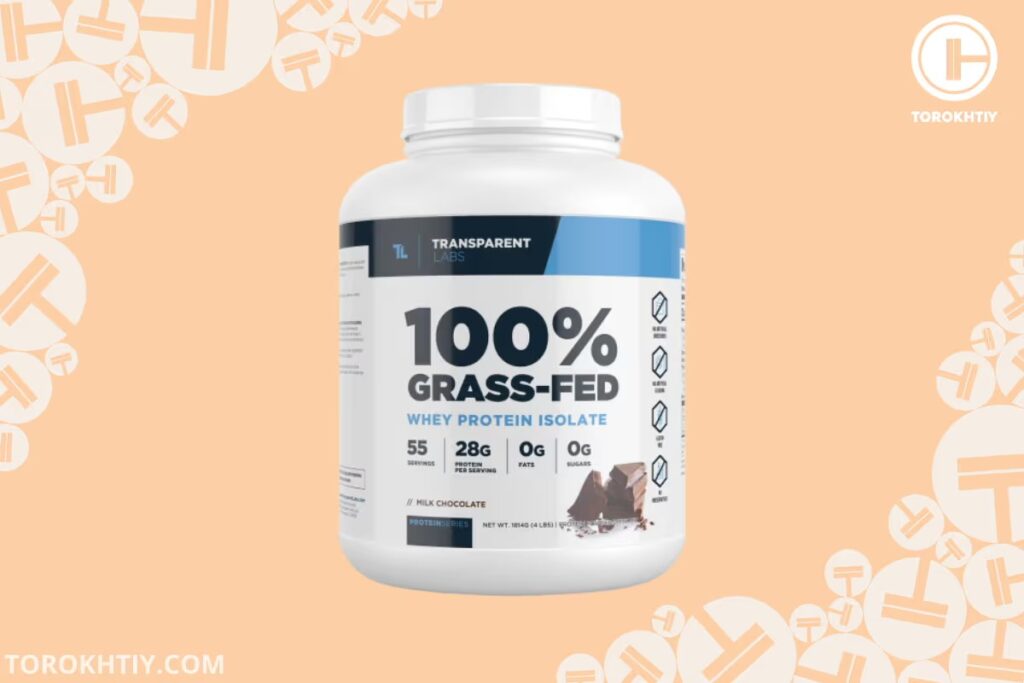L-Carnitine for Weight Loss: Does It Really Work?
Interested in using L-Carnitine for weight loss? While it’s commonly thought that L-Carnitine is an effective supplement for dieting, it may be better suited for different purposes. Current research suggests that L-Carnitine does not have significant effects on weight loss, and is better suited for improving endurance and recovery.
If you’re interested in using L-Carnitine, check out Recharge – Post-Workout Supplement | Legion. For a weight loss supplement, whey protein is one of your best options. Our top pick is 100% Grass-Fed Whey Protein Isolate Powder – Transparent Labs.
While people commonly use L-Carnitine for weight loss, current research suggests it’s not especially useful for this purpose. While L-Carnitine does play a valuable role in fat metabolism in our body, supplementation does not appear to improve this process. Instead, L-Carnitine supplementation is better suited for improving endurance and recovery.

What Is L-Carnitine and What Does It Do for Our Body?
L-Carnitine is a non-essential amino acid that is produced from the essential amino acid Lysine. Most people can synthesize enough L-Carnitine naturally to avoid deficiency. While carnitine is synthesized by the body, it can also be found in food sources, mainly meat.
So, how does our body put L-Carnitine to use? Let’s take a closer look.
Fat Metabolism and Energy Production
This amino acid plays a valuable role in transporting long-chain fatty acids, and the process of mitochondrial fatty acid oxidation. Carnitine helps to transport fatty acids into the mitochondria where they are converted into ATP, which is a source of energy.
It’s also worth noting that this process of using fats for energy may help spare some glycogen during exercise, and lead to reduced lactate accumulation as a result! This may in turn help endurance performance to a moderate degree.
Because L-Carnitine plays a role in using fatty acids as energy, this is where the perceived relationship between L-Carnitine and weight loss comes from. However, as we’ll cover more in-depth below, current research suggests that supplementation won’t have much of an effect on weight loss.
L-Carnitine for Weight Loss: Does It Really Work?
Because of the role L-Carnitine plays in the body, it’s been thought that supplementation will increase the body’s ability to convert fatty acids into energy. So, is L-Carnitine a fat burner?
Current research shows that L-Carnitine supplementation does not significantly increase the body’s ability to burn fat during exercise. This is likely because most people already have sufficient carnitine levels to oxidize fat, and the body is not able to put extra L-Carnitine to use for this purpose.
While L-Carnitine may help you burn fat more efficiently, it won’t necessarily increase your ability to lose weight. Therefore L-Carnitine weight loss results are minimal at best.
These results are true regardless of the form the supplement is in. So, whether you’re looking to take L-Tartrate L-Carnitine, or Acetyl L-Carnitine for weight loss, neither will make much of a difference. Form also doesn’t matter too much, whether its powder, capsules, or liquid l-carnitine. It’s worth noting that while L-Carnitine injections for weight loss likely aren’t beneficial, this may be the best way to use L-Carnitine for recovery!
While L-Carnitine does play a valuable role in the body’s natural fat-burning process, supplementation will not increase this process. So, is L-Carnitine supplementation completely useless? Not necessarily. As we’ll show below, research has shown that L-Carnitine supplementation may still be beneficial outside of fat loss.

L-Carnitine for Other Purposes
So, if you shouldn’t use L-Carnitine for fat loss, then what is it useful for? Current research shows that L-Carnitine likely won’t improve endurance performance. However, it may be beneficial in improving recovery. Additionally, because it’s largely found in animal products, it may be beneficial for vegans as well. Let’s take a closer look at these effects.
1. May Improve Endurance Performance
As mentioned, on top of its role in fat metabolism, L-Carnitine plays a role in providing energy during endurance exercise. It also appears that L-Carnitine improves blood flow both during and after exercise. As a result, people often assume that supplementation may help with energy production during endurance exercise.
However, similar to L-Carnitine supplementation not improving fat loss properties, current research suggests that supplementation does not improve RPE or time to fatigue in endurance female athletes. Again, this is likely because the body already naturally produces enough L-Carnitine to perform these functions, rendering supplementation unnecessary.
2. May Aid in Recovery During Periods of Heavy Training
While L-Carnitine supplementation isn’t ideal for either fat loss or endurance training, its one main research-backed use case is for recovery. It’s theorized that L-Carnitine helps with recovery, because L-Carnitine works to protect cell membranes from oxidative stress.
This theory has been proven by studies testing L-Carnitine’s effect specifically on post-exercise muscle soreness. 2 weeks of consistent daily supplementation raises plasma L-Carnitine levels. After 3 weeks of supplementation with 2-3g/day, it appears L-Carnitine will help reduce post-exercise pain.
So, if you experience moderate to severe DOMS effects after exercise, L-Carnitine supplementation may be beneficial in reducing your pain.
It’s also worth noting that L-Carnitine supplementation has been shown to increase androgen receptor density in muscle cells alongside resistance training, which may have applications for both performance and recovery.

3. Can Be Considered by Vegans
Finally, L-Carnitine may produce more significant effects on vegans and vegetarians. While it’s unlikely for vegans and vegetarians to be deficient in L-Carnitine, they will still have lower dietary intake, which may in turn lead to lower levels of L-Carnitine in the body.
As a result, L-Carnitine supplementation may have more of an effect on vegans than it does on meat-eaters. In the rare case someone is deficient in L-Carnitine, supplementation may make a difference in things like fat metabolism and endurance performance.
Overall, the difference in L-Carnitine’s effects between vegans and meat eaters will likely be minimal, although vegans may still notice slightly more significant effects.
Tips for Effective and Sustainable Weight Loss
As covered, L-Carnitine is not an effective supplement for weight loss. This may leave you wondering, how do I lose weight? Below we’ll be covering 4 tips for sustainable and effective weight loss.
1. Follow a Flexible Meal Plan With a Calorie Deficit
First, figure out a meal plan that you can stick to that’s conducive to weight loss. Try to be flexible and include foods you enjoy, maybe just in smaller portions. Not restricting yourself too much will make it much more likely to stick with your diet in the long term. You’ll only lose weight with consistency, so we can’t stress this point enough.
Regardless of what you’re eating, the only way you’ll lose weight is by staying in a consistent caloric deficit. If you’re unfamiliar with this term, it means eating fewer calories than you burn throughout the day. We recommend eating in a deficit of 250-500 calories a day to promote fat loss, without losing too much muscle!
To figure out how many calories you should eat a day, start by figuring out your maintenance calories with an online calorie calculator. From there, subtract 250-500 calories from that number depending on how fast you want to lose weight. We recommend tracking your calories to ensure you’re not accidentally over eating.
From here, it’s crucial you consistently monitor your weight to make sure you’re actually losing weight. Online calorie calculators are notoriously inaccurate, so your initial calories per day may not lead to weight loss. If you’re not losing weight, gradually reduce your calorie intake until you’re making consistent progress.
2. Eat Enough Protein to Keep You Full and Minimize Muscle Loss
Once you’ve figured out how many calories you need to lose weight, you should prioritize getting adequate protein intake to prevent excessive muscle loss. Especially if you’re coming off a bulk, the last thing you want is to lose all the muscle you worked so hard to put on!
It’s recommended that you eat 0.5-0.8g of protein per pound of bodyweight daily when looking to build muscle. Eating in a slightly higher amount like 1g per pound of bodyweight may be ideal.
However, you may want to consume additional protein on top of this to help with satiety. Foods high in protein are likely to make you feel more full than foods heavy in carbs specifically. This is because protein takes longer to digest in the stomach than carbohydrates, leading to more satiation for the same amount of calories.
It’s worth noting that fats take the longest time to digest in the stomach. However, they are also more calorically dense than protein and carbs, which is likely why protein is still seen as the most satiating macronutrient.
3. Do Strength Training
If you’re trying to maintain muscle mass on a diet, equally as important as eating enough protein is practicing strength training. While you may associate cardio with weight loss, strength training is still necessary on a cut to maintain your muscle mass.
If you’re coming off a bulk, you should be fine performing similar training to what you were doing while bulking. You may want to focus on adding more volume to your workout to help burn additional calories.
If you’re new to the gym, start a program that targets every major muscle group at least once a week. You should be able to build muscle at the same time as you lose fat if you’re training properly.
4. Be Consistent and Don’t Count on “Magic” Pills
Finally, the biggest key to weight loss is staying consistent with your diet and training. As mentioned above, you’ll never make meaningful progress if you give up after a couple of weeks. Don’t get discouraged if the fat doesn’t come flying off after a few days. These things take time, and you’ll only get the results you want if you truly commit to your diet.
On that note, don’t think that there’s a “magic” solution for weight loss because they don’t exist (at least one that was researched properly and proven to be safe for humans). While there are supplements you can take to help you on your journey, most purported “fat-burners” like L-Carnitine will have a very minimal effect on your body’s ability to lose weight.
The only genuine way to lose weight is to eat fewer calories than you’re using in a day. While this is easier said than done, if you can do this consistently, you’re guaranteed to lose weight.
Best L-Carnitine Supplement – Recharge by Legion
As long as you’re aware that L-Carnitine is more useful as a recovery supplement than it is as a fat burner, it may still be beneficial for you. If you’re interested in trying L-Carnitine out, we recommend taking it as part of a high-quality multiple-ingredient supplement like Legion’s Recharge. Let’s take a closer look.
First, in terms of L-Carnitine content, you can expect 2.1g per serving. With the recommended daily dose of L-Carnitine being 2-4g/day, this is an ideal serving size.
This supplement also contains 5g of micronized creatine monohydrate per serving. If you’re unfamiliar with creatine, it’s one of the most effective and well-researched sports supplements available. Some of the benefits of creatine include improved high-intensity exercise performance, reduced fatigue, and better recovery (which may work synergistically with the effects of L-Carnitine).

It’s worth noting that one of the effects of creatine is weight gain, so many people may choose to avoid it during a cut. However, weight gain from creatine is largely water stored in the muscles, which is lean mass. So, creatine won’t increase fat mass at all, and will likely make you appear more muscular while on a cut.
It’s also somewhat uncommon for a multi-ingredient supplement to have an effective dose of creatine. With the ideal dose of Creatine being 3-5g a day, you can take Recharge every day for an optimal dose of this supplement.
Recharge also comes in a solid 7 flavors, giving you a ton of variety. It works out to be about $1.00 per serving as well. While you can likely find standalone L-Carnitine and Creatine supplements for cheaper, you’re getting a high-quality, 2-in-1 product here, so it’s up to you if that’s worth the price.
Best Protein for Weight Loss – 100% Grass-Fed Whey Protein Isolate Powder by Transparent Labs
Now, if you were considering taking L-Carnitine for weight loss, you may be wondering what supplements you can take instead. Because of the protein intake required to maintain muscle mass while cutting, one of the best supplements you can take is a simple high-quality whey isolate. If you’re interested, then check out Transparent Labs Whey Isolate. Each serving has a solid 28g of protein, making it very helpful for hitting high protein requirements. There’s also only 1g of carbs, for a total of 120 calories. This makes it ideal for staying in a limited calorie intake.

Like all Transparent Labs products, this is also made from exceptionally high-quality ingredients with no unnecessary fillers. Their Isolate is made from 100% Grass-Fed dairy, which is healthier than regular milk!
Transparent Labs’ Isolate only comes in 2 flavors – chocolate and vanilla – but reviews suggest an outstanding taste. This may help curb any cravings you have on a cut!
This supplement works out to be ~$1.82 per serving, so it is significantly more expensive than a standard L-Carnitine supplement. However, it will likely be much more beneficial for you when trying to lose weight!
FAQ
Is It Safe to Take L-Carnitine Every Day?
Yes, a standard 2g daily dose of L-Carnitine does appear to be safe for most people over a long time frame. It’s worth noting there may be some connection between L-Carnitine supplementation and cardiac events. If you have pre-existing heart problems or are concerned about the potential negative effects of L-Carnitine, consult with a doctor before use.
Can I Lose Weight With L-Carnitine Without Exercise?
No, L-Carnitine is far from a magic supplement for losing weight. In fact, it’s unlikely that L-Carnitine has any effect whatsoever on weight loss. The only way to lose weight consistently is to exercise regularly and eat in a caloric deficit. There are no supplements that make up for a bad diet and a lack of physical activity.
Does L-Carnitine Reduce Belly Fat?
No, as mentioned above, research has shown that L-Carnitine has no real effect on weight loss. Additionally, it’s impossible to spot reduce fat in specific areas like the stomach. The only way to reduce belly fat is to reduce your total body fat percentage. While fat may be tougher to lose in certain areas, the more weight you lose overall, the more belly fat you’ll lose as well.
How much L-Carnitine to Take for Weight Loss?
L-Carnitine does not affect weight loss, regardless of how much you’re taking. Therefore, the L-Carnitine dosage for weight loss is irrelevant, as no dose will have a major effect. The same goes for questions like when to take L-Carnitine for weight loss – at the end of the day, it doesn’t really matter.
Conclusion
L-Carnitine is an amino acid that plays a valuable role in the body’s ability to convert fatty acids into cellular energy. Because of this, supplementation is commonly thought to increase this process and help with weight loss. However, L-Carnitine supplementation for fat loss has not been shown to increase the body’s ability to lose fat.
L-Carnitine has instead been shown to be useful mainly for improving recovery, which is what we recommend it for. A more beneficial weight loss supplement will likely be a high-quality whey protein isolate.
While we can’t recommend any L-Carnitine supplement for weight loss, if you’re interested in trying L-Carnitine for recovery, consider trying Recharge by Legion. If you’re looking for a high-quality whey protein for weight loss, check out 100% Grass-Fed Whey Protein Isolate Powder by Transparent Labs.
Do you have any experience using L-Carnitine? Were you aware that this supplement doesn’t have much of an effect on weight loss? Let us know your thoughts in the comments below!
Also read:
- L Citrulline vs Citrulline Malate
- Foods High in Citrulline
- Glutamine or Glutamate
- Glutamine Foods
- L-Glutamine Weight Loss
- L Glutamine or L Carnitine
- Acetyl L Carnitine vs L Carnitine
- Best Glutamine Supplement
References:
- AIS SPORTS SUPPLEMENT FRAMEWORK CARNITINE (L-CARNITINE), (Australian Institute of Sport, 2021), 3.
- C. Snoke, G. Agnesse, K. Boles, J. Daniels, A. Holum, J. McKenzie, “EFFECTS OF ACUTE L-CARNITINE SUPPLEMENTATION DURING LOW-INTENSITY TREADMILL EXERCISE” Oxford Referencing Guide, https://digitalcommons.wku.edu/ijesab/vol8/iss9/15/ (accessed 2021).
- William Kraemer, L-Carnitine Supplementation: A New Paradigm for its Role in Exercise (Australian Institute of Sport, 2005).
- Melissa Eryn Stack, The Effects of Chronic L-carnitine and Carbohydrate Supplementation on Body Composition and Athletic Performance in Female Endurance Athletes (Georgia Southern University , 2017).
- William J Kraemer 1, Jeff S Volek, Duncan N French, Martyn R Rubin, Matthew J Sharman, Ana L Gómez, Nicholas A Ratamess, Robert U Newton, Bozena Jemiolo, Bruce W Craig, Keijo Häkkinen, The effects of L-carnitine L-tartrate supplementation on hormonal responses to resistance exercise and recovery (National Library of Medicine), https://pubmed.ncbi.nlm.nih.gov/12930169/, 2003 Aug;17(3):455-62.
- Barry A Spiering 1, William J Kraemer, Jakob L Vingren, Disa L Hatfield, Maren S Fragala, Jen-Yu Ho, Carl M Maresh, Jeffrey M Anderson, Jeff S Volek, Responses of criterion variables to different supplemental doses of L-carnitine L-tartrate (National Library of Medicine), 2007 Feb;21(1):259-64.
- Angelika K. Sawicka, Gianluca Renzi & Robert A. Olek, The bright and the dark sides of L-carnitine supplementation: a systematic review (Journal of the International Society of Sports Nutrition, September 21, 2020), https://jissn.biomedcentral.com/articles/10.1186/s12970-020-00377-2
- William J Kraemer 1, Barry A Spiering, Jeff S Volek, Nicholas A Ratamess, Matthew J Sharman, Martyn R Rubin, Duncan N French, Ricardo Silvestre, Disa L Hatfield, Jaci L Van Heest, Jakob L Vingren, Daniel A Judelson, Michael R Deschenes, Carl M Maresh, Androgenic responses to resistance exercise: effects of feeding and L-carnitine (National Library of Medicine), 2006 Jul;38(7):1288-96..
Why Trust Us?
With over 20 years in Olympic Weightlifting, our team does its best to provide the audience with ultimate support and meet the needs and requirements of advanced athletes and professional lifters, as well as people who strive to open new opportunities and develop their physical capabilities with us.
By trusting the recommendations of our certified experts in coaching, nutrition, dietology, and sports training programming, as well as scientific consultants, and physiotherapists, we provide you with thorough, well-considered, and scientifically proven content. All the information given in the articles concerning workout programming, separate exercises, and athletic performance, in general, is based on verified data. We ensure that you can rely on our professionals’ pieces of advice and recommendations that can be treated as personalized ones which will benefit you and fully meet your needs.
The product testing process is described in more detail here
Author: Jacek Szymanowski
Certified Nutritionist,
M.Sc.Eng. Biotechnology
Performance Architect,
Strength and Conditioning Specialist
With over 30 years of fighting experience, specialization in nutrition coaching for athletes, and expertise in metabolic health and dietary strategies, Jacek offers a comprehensive approach to optimizing your performance and well-being. Backed by a Master of Science degree in Biotechnology, Jacek remains at the forefront of scientific advancements, ensuring that his coaching is always evidence-based and up-to-date.









